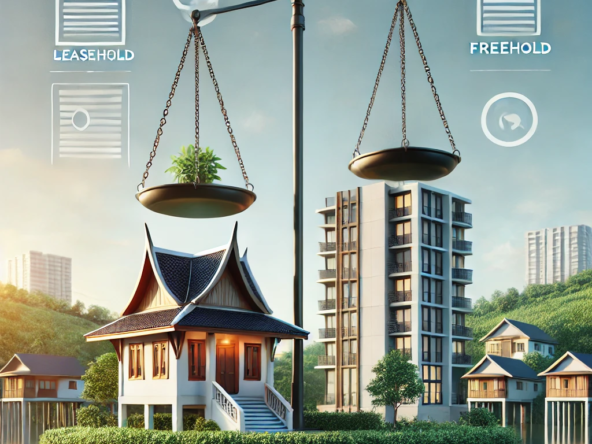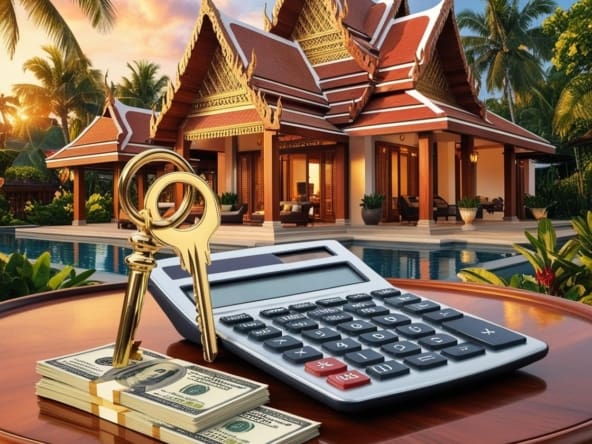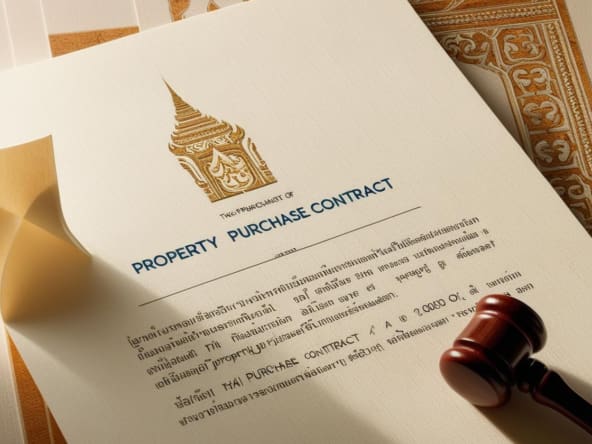Thailand is a dream destination for many looking to invest in property, whether for personal use, vacation rentals, or long-term investment. However, navigating the complexities of property taxes and fees can be a daunting task for both local and foreign buyers. Understanding these financial obligations is crucial for making informed decisions and ensuring a smooth property transaction process. In this guide, we will break down the various costs associated with buying property in Thailand, including taxes, maintenance fees, and other relevant expenses.
Understanding Property Ownership in Thailand
Before diving into the financial aspects, it’s important to clarify property ownership regulations in Thailand, particularly for foreign buyers. Foreign nationals can own condominiums outright, provided that foreign ownership does not exceed 49% of the total units in the building. For land, foreign ownership is more restricted; however, many choose to set up a Thai company or enter into a long-term lease agreement.
Key Types of Property in Thailand
- Condos: These are the most straightforward properties for foreigners to purchase, allowing them to enjoy full ownership rights.
- Land: Foreigners cannot directly own land but can invest through a leasehold agreement or set up a Thai company. This often involves a 30-year lease with the option to renew.
- Houses: Foreign ownership of houses is typically done through lease agreements or corporate ownership, which can complicate the buying process.
Costs Associated with Buying Property in Thailand
When purchasing property in Thailand, it is essential to budget not just for the purchase price but also for various taxes and fees. Below is a detailed overview of the primary costs involved.
1. Transfer Fee
The transfer fee is one of the main expenses when buying property in Thailand. This fee is typically set at 2% of the appraised value of the property, which is assessed by the local land office.
- Who pays the transfer fee? Generally, the seller is responsible for the transfer fee, but it is common for the buyer and seller to negotiate who will cover this cost during the sale agreement.
2. Stamp Duty
The stamp duty is levied at 0.5% of the appraised value or the sale price, whichever is higher.
- When is it paid? The stamp duty is payable at the time of the transfer of ownership. If the seller has owned the property for more than five years, they may choose to pay a specific business tax instead of stamp duty.
3. Specific Business Tax (SBT)
The Specific Business Tax applies when selling property that is not the owner’s primary residence and is set at 3.3% of the appraised value or the sale price.
- Who pays it? The seller is generally responsible for this tax. If the property has been owned for less than five years, the seller must pay either the SBT or the stamp duty, not both.
4. Withholding Tax
Withholding tax is applicable to sellers, particularly for properties classified as commercial. This tax can range from 1% to 3%, depending on the seller’s income bracket.
- How is it calculated? The withholding tax is calculated based on the seller’s income from the sale, taking into account the length of ownership.
5. Land Office Fees
In addition to the taxes mentioned, there are land office fees associated with the transfer of ownership. These fees typically vary by province but generally include:
- Registration fee: Approximately 1% of the property’s appraised value.
- Legal fees: Depending on the complexity of the transaction, legal fees can vary significantly. It’s advisable to budget around 1% to 2% of the purchase price for legal assistance.
Ongoing Costs of Property Ownership in Thailand
Once you’ve navigated the initial costs of purchasing property, it’s essential to be aware of ongoing expenses that will arise from owning a property in Thailand.
1. Maintenance Fees
If you purchase a condominium, maintenance fees are typically charged monthly or quarterly. These fees cover communal services such as:
- Security
- Cleaning
- Pool maintenance
- Landscaping
Maintenance fees usually range from 20 to 100 THB per square meter, depending on the location and amenities provided. For instance, a 50-square-meter unit may incur maintenance fees ranging from 1,000 to 5,000 THB per month.
2. Property Taxes
Thailand levies property taxes at both the local and national levels.
- Local Development Tax: This is charged at a rate of 0.3% of the property’s appraised value. This tax is generally assessed on residential properties every year.
- Local Income Tax: This tax is applicable for rental properties and is set at a rate of 12.5% of rental income.
In 2020, the Thai government introduced the Land and Buildings Tax, which replaced the previous local development tax and property tax. This tax system aims to promote efficient land use and provide a clearer structure for property taxation.
3. Utilities
As a property owner, you’ll be responsible for utility costs, including:
- Electricity
- Water
- Internet and cable
Utility costs can vary based on usage and location but expect to budget around 2,000 to 5,000 THB per month for a standard apartment or house. For example, electricity costs can be particularly high in hot months due to air conditioning usage, with rates typically around 4.5 THB per unit.
Special Considerations for Foreign Buyers
Navigating the property market in Thailand can present unique challenges for foreign buyers. Here are some essential tips:
1. Legal Representation
Hiring a qualified real estate attorney is advisable to navigate the complexities of Thai property law. An attorney can assist with contract review, due diligence, and ensure compliance with local regulations.
2. Due Diligence
Before purchasing any property, conduct thorough due diligence, including:
- Property title verification: Ensure the title is clear and free of liens.
- Building inspections: Check for structural issues or necessary repairs.
- Ownership structure: Ensure compliance with foreign ownership laws.
According to the latest statistics from the Bank of Thailand, foreign ownership in the real estate sector continues to grow, with approximately 18% of all property transactions in popular tourist destinations like Bangkok and Phuket involving foreign buyers.
3. Currency Fluctuations
For foreign buyers, fluctuations in currency exchange rates can impact the overall cost of purchasing property. For example, if you are converting from USD to THB, a drop in value can significantly affect your purchasing power. Consider discussing options with a financial advisor or using forward contracts to lock in exchange rates.
Additional Financial Considerations
Investing in property in Thailand is not just about the immediate costs; it also involves understanding the broader financial landscape. Here are some additional factors to consider:
1. Financing Options
While most foreign buyers choose to purchase property outright, financing options are available. Many Thai banks offer mortgages to foreigners, typically up to 70% of the property value for a term of 15 to 20 years. However, banks may have specific requirements, including proof of income and residency status.
2. Market Trends and Property Values
Understanding the local property market is crucial. According to Knight Frank’s 2023 Thailand Market Overview, property prices in Bangkok have seen a steady increase, with an average growth of 5% year-on-year in high-end condominiums. Areas such as Sukhumvit and Silom continue to attract foreign investment due to their proximity to amenities and transport links.
3. Insurance
Property insurance is often overlooked but is an important aspect of ownership. While not legally required, having comprehensive insurance can protect your investment from unforeseen events like natural disasters or theft. Basic home insurance costs can range from 3,000 to 10,000 THB annually, depending on the property value and coverage level.
Summary of Costs Involved in Buying Property in Thailand
To provide a clear overview of the financial obligations associated with purchasing property in Thailand, here’s a summary of the various costs involved:
Initial Costs
- Transfer Fee: 2% of the appraised value of the property.
- Stamp Duty: 0.5% of the appraised value or sale price.
- Specific Business Tax (SBT): 3.3% for properties not classified as primary residences (if applicable).
- Withholding Tax: 1% to 3%, depending on the seller’s income bracket.
- Land Office Fees:
- Registration Fee: Approximately 1% of the appraised value.
- Legal Fees: 1% to 2% of the purchase price.
Ongoing Costs
- Maintenance Fees: 20 to 100 THB per square meter (approx. 1,000 to 5,000 THB/month for a 50 sqm unit).
- Property Taxes:
- Local Development Tax: 0.3% of the property’s appraised value annually.
- Local Income Tax: 12.5% of rental income (if applicable).
- Utilities: 2,000 to 5,000 THB per month for standard services.
- Insurance: 3,000 to 10,000 THB annually.
Conclusion
Investing in property in Thailand can be a rewarding experience, but understanding the associated taxes and fees is essential for making informed decisions. From transfer fees and stamp duties to ongoing maintenance and utility costs, being aware of these financial obligations will help you navigate the real estate landscape effectively.
By taking the time to research and understand the costs involved



